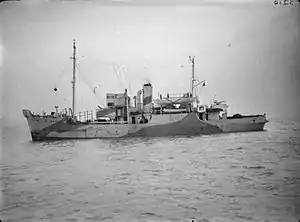 | |
| Class overview | |
|---|---|
| Name | Linnet |
| Operators | |
| In commission | 1938–1964 |
| Completed | 3 |
| Lost | 1 |
| Retired | 2 |
| General characteristics | |
| Type | Minelayer |
| Displacement | 498 tons standard |
| Length | |
| Beam | 27 ft 2 in (8.28 m) |
| Draught | 8 ft 0 in (2.44 m) |
| Propulsion |
|
| Speed | 10.5 knots (19.4 km/h) |
| Complement | 24 |
| Armament |
|
The Linnet class were a class of three small coastal minelayers commissioned into the Royal Navy just before the Second World War.
Description
The Linnet class were the largest of a dozen specialized vessels known as "Indicator Loop Mine Layers" built for the Royal Navy immediately before and during the Second World War. These vessels were designed to lay controlled mines, used in coastal defences, as well as anti-submarine indicator loops. Similar vessels known as mine planters were operated by the US Army during the same era.[1]
Ships of the class had a displacement of 498 tons standard and a length of 145 ft 0 in (44.20 m) between perpendiculars. They were equipped with a single 20 mm gun and two machine guns. They had two triple expansion engines which allowed the ship to have a maximum speed of 10.5 knots (19.4 km/h; 12.1 mph). There was a complement of 24 officers and crew and a total mine capacity of 12.[2]
Ships
| Name | Builder | Launched | Fate | Notes |
|---|---|---|---|---|
| Linnet (M69) | Ardrossan Dockyard | 3 May 1938 | Broken up in 1964 | Tender to HMS Vernon |
| Redstart (M62) | Henry Robb | 3 May 1938 | Scuttled on 19 December 1941 | Scuttled in Hong Kong to prevent its capture by the Japanese[1] |
| Ringdove (M77) | Henry Robb | 15 June 1938 | Sold in 1950 to Pakistan as a pilot vessel | Tender to HMS Vernon |
Notes
- 1 2 Walding, Richard. "Royal Navy Harbour Defences - Hong Kong". Indicator Loops. Retrieved 1 September 2022.
- ↑ Cocker, pp. 20-21
References
- Jane's Fighting Ships 1939, p. 98
- Cocker, M.P. (1993). Mine Warfare Vessels of the Royal Navy: 1908 to Date. Shrewsbury, England: Airlife Publishing. ISBN 1-85310-328-4.